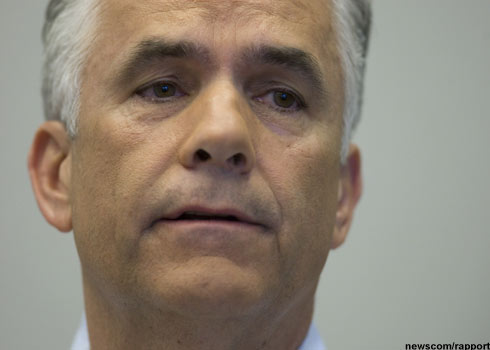The Senate Ethics Committee’s decision to appoint a special counsel to lead the investigation into activities surrounding Sen. John Ensign’s (R-NV) affair with a political staffer is raising age-old questions about the panel’s relevancy.
Members of Congress are the first to admit that they hate serving on the Ethics Committee, and policing their peers puts them in an unusually awkward position. If that’s the case and the panel has to farm out its work to true professional investigators, then why have lawmakers investigating their colleagues misbehavior in the first place?
The Ensign case is particularly troubling because the investigation was well underway last year, and Ensign staffers had testified to the panel that Ensign and his senior aides knew they were breaking the one-year lobbying ban when they helped
a former staffer set up a short-lived career on K Street, as The Hill reported last June.
In fact, at least one Ensign aide told the Ethics Committee that Ensign and Hampton were so bold about the lobbying job that the pair ate lunch together at least once in the Senate dining room, according to The Hill.
The information was provided as part of the panel’s probe into payments Ensign’s parents made to Cynthia and Douglas Hampton. Ensign was having an affair with Cynthia, who is married to Douglas.
Both worked for Ensign, and Douglas Hampton was a close political aide. Ensign’s parents paid the Hamptons $96,000 once they left the senator’s employment. Citizens for Responsibility and Ethics in Washington filed a complaint with the ethics panel, charging Ensign with paying the Hamptons hush money.
Ensign admitted to the affair in June 2009 but has denied any wrongdoing. He cites the December decision by the Justice Department to abandon its criminal investigation and the Federal Election Commission’s decision to drop a probe into whether payments to the Hamptons violated campaign rules.
Watchdogs are not convinced. The Justice Department’s public integrity section, which is charged with investigating allegations against members of Congress, has been gutted, and the FEC has long been known as a paper tiger that very rarely takes aggressive action against members, they contend.
Ensign’s case is exhibit A for why Congress should hand all authority to investigate serious allegations against members of Congress over to an independent ethics office equipped with attorneys who specialize in white-collar crime, argues Public Citizen’s Craig Holman.
“The way the Congressional ethics committee are set up — they are set up to be hindered in their responsibilities and they tend to be very unprofessional,” he said. “We see partisan leaks coming out of their investigations and they don’t seem to be able to handle the job that has been assigned to them.”
Operating within the current system, however, the ethics committee has no choice but to appoint an outside counsel in dicey, serious cases, Holman said, because there are just too many conflict-of-interest issues involved in finding a colleague in serious violation of ethics rules or the law.
The Campaign Legal Center’s Meredith McGehee agrees. In fact, she welcomed the appointment of the special counsel in Ensign’s case because it’s so fraught with complicated ethics and possibly even criminal violations that she’s more confident that an outside, independent attorney can handle the job fairly.
“The Ethics Committee on either side is staffed for run-of-the-mill investigations not cases like Ensign’s, which is extraordinary and involves potentially criminal matters,” she said. “I’m always pretty happy when they decide to go with an outside counsel.”
McGehee was involved in filing the ethics complaint that prompted the 1990s “Keating Five” investigation, which resulted in public ethics hearings on the activities of five senators, including Sen. John McCain (R-Ariz.), who met with banker Charles Keating in the savings-and-loan scandal. The Senate Ethics Committee chose to hand the case over to Robert Bennett, who served as the special counsel. The case ended in former Sen. Alan Cranston (D-CA) receiving a “strong and severe” reprimand. Cranston retired instead of seeking reelection.
Back in December, the House Ethics Committee considered hiring a special counsel to take over the case against Rep. Maxine Waters (D-CA), who is accused of improperly intervening to help a minority-owned bank in which her husband owns stock and previously sat on its board. That case has been in limbo ever since the panel indefinitely delayed a public trial scheduled for late November and placed the lead attorney on the case and an assisting attorney on administrative leave.
Rep. Zoe Lofgren (D-CA), who chaired the committee at the time, argued that the two lawyers had bungled the case and wanted a clean slate. The ethics panel has never publicly indicated what type of mistakes, if any, the pair made, and some ethics committee critics want a special counsel to investigate the way the case was conducted before moving forward with any new action in the Waters’ case.
Rep. Jo Bonner (R-Ala.), the new chairman, has yet to say how he plans to move forward on Waters after six months of nasty public confrontations with her and the attorneys’ alleged mishandling of the case.









